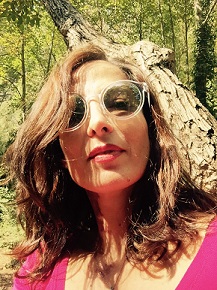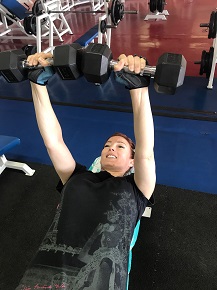Faces of COPD: Rabiya Taok says 'It's Your Own Journey'
Posted on November 05, 2017 |
Rabiya shares with us a very candid, determined and optimistic story about living with COPD.
Rabiya, who is 41 years old and lives in Lebanon, describes her life before COPD as a “daily adventure”. She was a drama teacher and creative copywriter. Sports were part of her daily life, her favorite being “outdoor sports of all kinds, especially extreme.” Her evenings were filled “celebrating life with friends and new people.”
 Leading up to and since being diagnosed with COPD this “has all shifted. I lost my ability to go to work because I have limited body strength.” No longer can Rabiya stand all day doing theater rehearsals and body exercises with her students. As for the advertising agency job, she lost that due to her health decline and “weekly hospital schedule for augmentation therapy.”
Leading up to and since being diagnosed with COPD this “has all shifted. I lost my ability to go to work because I have limited body strength.” No longer can Rabiya stand all day doing theater rehearsals and body exercises with her students. As for the advertising agency job, she lost that due to her health decline and “weekly hospital schedule for augmentation therapy.”
It took “two long years” to be diagnosed with COPD. She saw ten doctors, many of whom tried to convince Rabiya her illness was psychological, not physical; despite the little lung capacity she showed after each lung function test she made. But now, despite the heaviness of accepting this fact, she’s happy to know “what’s wrong with this body of mine. It’s not my mind or my emotions that are sick. It’s my lungs.”
Since support is crucial, Rabiya is trying to engage ministry of public health to raise awareness about COPD, with the help and guidance of the COPD Global initiative. Early diagnosis is essential, yet, the norms in her country are not even close to the universal medical protocols, where numerous patients are misdiagnosed. Patients who live with COPD are individuals with disabilities who needs support and understanding because the symptoms are often invisible and unknown even to care givers.
Rabiya says she’s now “trying to adapt with the maximum quality of life. The gym is my only option because the land where I live is all hills and the air outside is extremely contaminated which makes it challenging, if not impossible, for people like me to be able to do outdoor physical activities”
At the gym, Rabiya lifts weights so she can “stay in shape and trick my body into adapting to the constant drop in oxygen levels. I’m planning to lead the way for future patients by prepping my body daily as an athlete with a lung condition. It’s working so far and I will continue to do so until I build a COPD support group in my country.”
If you’ve been diagnosed with COPD, Rabiya says “don’t lose time grieving or comparing the changes in your life and body strength, especially if it happened suddenly like it did with me. There is nothing constant about this life anyway. Face it boldly and deal with it with all the positivity that you can. And on days when you feel like you can’t accept it, cry and be sad as much as you need to, then rise again and try again. Keep doing so until you’re strong enough to adapt and follow a strict food and exercise diet.”
 Rabiya also says it’s crucial to “stay active and even if you have to draw a fake smile, do it. It's your own journey even if you are perfectly healthy. Simply love the skin you’re in. Love your vulnerable body but do see it from a strength perspective. Do not pity yourself, for it’s only the body that’s a little weak. So your pain is only on the surface. Your soul is fine. Sick or healthy, stand by yourself and love that vehicle you live in, because that's all you have.”
Rabiya also says it’s crucial to “stay active and even if you have to draw a fake smile, do it. It's your own journey even if you are perfectly healthy. Simply love the skin you’re in. Love your vulnerable body but do see it from a strength perspective. Do not pity yourself, for it’s only the body that’s a little weak. So your pain is only on the surface. Your soul is fine. Sick or healthy, stand by yourself and love that vehicle you live in, because that's all you have.”
“Truthfully,” Rabiya adds, “it’s so scary to think of the days to come when I know it’s only going to get worse. But the worst has already happened and yet here I am and I’m okay.”
These days, Rabiya finds solace in writing. “I'm in the middle of writing an inspirational book about my condition. Swimming against the tide, because there is no inspiration with choking by COPD. But I want to find a way of doing so, if not for my sake then for the sake of others because I don’t want anyone to suffer the way I did.”
Looking ahead, Rabiya knows “the way is still vague and long but I’m determined to make the best of it. I will create a quality of life that even healthy people would want to adopt. It is what it is. Sink or swim. I'd rather swim or die trying.”